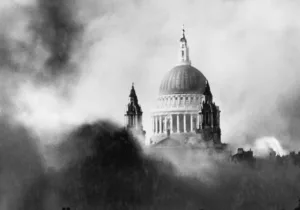It’s too bad yesterday’s 400th anniversary of the Western Hemisphere’s oldest continuous legislative assembly was overshadowed by contemporary political controversies. The governor of Virginia and U.S. president could not even overlap in their visits to Jamestown for the commemoration.
The Virginia Colony’s General Assembly, later called the House of Burgesses, first convened at Jamestown’s church in July 1619. And Virginia’s legislature has continued across four centuries. It trained members such as George Washington, Thomas Jefferson, Patrick Henry, George Mason and James Madison in the ways of democracy. It constructed laws for America’s first English settlement and represents the transfer of the British political tradition to America, which would begin its globalization.
Within days of the first session of the Virginia General Assembly on sticky hot July days, British privateers delivered Virginia’s first African slaves. Their arrival launched 240 years of slavery in America, culminating in Civil War, a century of conflict over civil rights, and gapping racial wounds.
The advent of both legislative democracy and slavery nearly at the same time in Virginia signifies the tragedy of fallen humanity. Civilization’s greatest triumphs for justice and humanity are always accompanied by enormous personal and social sins with trans-generational consequences.
That Summer of 1619 along the James River ensured that America would become the world’s greatest republic, which would also suffer across its history almost unbridgeable social and racial divides. From Virginia’s legislature would emerge the ethos and traditions to combat injustice, culminating in Jefferson’s affirmation of human equality. And from it would emerge a system of governance, in Madison’s Constitution, that countered inevitable human avarice, pride and frailty with checks and balances.
These principles and charters of human dignity that also recognized human limits were rooted in centuries of English tradition and governance. Jamestown’s legislative meeting of 1619 was the first major political advance for that tradition beyond the British isles. That tradition would continue to expand throughout the Anglosphere via Britain’s former colonies, which like Virginia would escape imperial control yet still benefit from the majesty of British law and polity.
Colonial Virginia and America of course adapted British traditions to their own historical experiences. The monarchy was always distant, and legislatures like the House of Burgesses often acted very independently, creating the attitude leading to independence. Also distant were the bishops of the established Church of England, who never crossed the Atlantic, and were never invited to do so. The churches in America were largely run democratically, further fertilizing the America’s own emerging independent political tradition.
The first General Assembly in Jamestown did meet at the church, the then only public building. That their system of governance premised on liberty and law assumed a transcendent moral order bequeathed by scripture and the church was indisputable to them. They were not necessarily as pious as New England’s later settlers, but they knew upon Whom they ultimately depended for a stable commonwealth that pursues justice.
Their understanding of natural order based on biblical cosmology and natural law amplified their ultimate sense of uniqueness and nationhood. As Allen Guelzo recently wrote:
The confidence that Americans displayed in the existence of a natural political order based on natural rights and natural law was so profound that Thomas Jefferson could describe the most basic of these rights—to life, liberty, and the pursuit of happiness—as “self-evident.” The Virginia Declaration of Rights—another product of the year 1776—explained that “all men . . . have certain inherent rights, of which, when they enter into a state of society, they cannot, by any compact, deprive or divest their posterity; namely, the enjoyment of life and liberty, with the means of acquiring and possessing property, and pursuing and obtaining happiness and safety.” Americans did not merely demand a corrected version of British common law or Britain’s hierarchical society; they proclaimed that they were creating a novus ordo seclorum.
The Virginia Declaration of Rights was drafted by George Mason, a Virginia legislator later considered the Father of the Bill of Rights. He was inspired by the English Bill of Rights of 1689 but also, like the other Founders, Virginian or otherwise, appreciated the exceptionality of the American experience. As Guelzo wrote:
The American mix of Enlightenment theory and practical experience in government produced a result that was seen from the first as—there is no other word for it—exceptional.
This exceptionality is traceable to Jamestown and July 1619. It’s the grateful child of the British political tradition but also uniquely American and distinct from it. British political institutions proliferate throughout the Anglosphere. But the American variant of it has universalized it and has made the Anglo-American political tradition the chief lodestar of democratic governance based on human rights and rule of law. This tradition benefits and is admired by many millions, aspired to by many who live outside its protection, and justly feared by autocrats and kleptocrats everywhere, who dispute the premise of the General Assembly of 1619 in Jamestown that the people, as image bearers of God, shall rule themselves.






 Live in the DC area? Sign-up for Providence's in-person events list!
Live in the DC area? Sign-up for Providence's in-person events list!